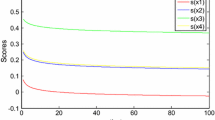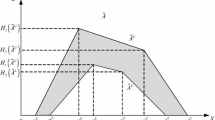Abstract
The intuitionistic triangular fuzzy set is a generalization of the intuitionistic fuzzy set. In practical applications, we find that the results derived by using the traditional intuitionistic triangular fuzzy aggregation operators based on intuitionistic triangular fuzzy sets are sometimes inconsistent with intuition. To overcome this issue, based on the [1/9, 9] scale, we define the concepts of intuitionistic multiplicative triangular fuzzy set and intuitionistic multiplicative triangular fuzzy number, and then we discuss their operational laws and some desirable properties. Based on the operational laws, we develop a series of aggregation operators for intuitionistic multiplicative triangular fuzzy information, and then apply them to propose an approach to multi-attribute decision making under intuitionistic fuzzy environments. Finally, we use a practical example involving the evaluation of investment alternatives of an investment company to demonstrate our aggregation operators and decision making approach.
Similar content being viewed by others
References
Atanassov, K. & Gargov, G. (1989). Interval-valued intuitionistic fuzzy sets. Fuzzy Sets and Systems, 31(3): 343–349
Atanassov, K.T. (1986). Intuitionistic fuzzy sets. Fuzzy Sets and Systems, 20(1): 87–96
Bordogna, G., Fedrizzi, M. & Pasi, G.A. (1997). Linguistic modeling of consensus in group decision making based on OWA operators. IEEE Transactions on Systems, Man, and Cybernetics, Part A, 27(1): 126–132
Bustince, H. & Burillo, P. (1996). Vague sets are intuitionistic fuzzy sets. Fuzzy Sets and Systems, 79(3): 403–405
Chen, S.M. & Tan, J.M. (1994). Handling multi-criteria fuzzy decision-making problems based on vague set theory. Fuzzy Sets and Systems, 67(2): 163–172
Gau, W.L. & Buehrer, D.J. (1993). Vague sets. IEEE Trans on System, Man and Cybernitics, 23(2): 610–614
Gong, Z.W. & Liu, S.F. (2006). Consistency and priority of triangular fuzzy number complementary judgment matrix. Control and Decision, 23(8): 903–907
Hong, D.H. & Choi, C.H. (2000). Multi-criteria fuzzy decision-making problems based on vague set theory. Fuzzy Sets and Systems, 114(1): 103–113
Jiang, Y., Xu, Z.S. & Yu, X.H. (2013). Compatibility measures and consensus models for group decision making with intuitionistic multiplicative preference relations. Applied Soft Computing, 13(4): 2075–2086
Lang, J.X. (2011). The study on ranking methods for triangular fuzzy numbers. Journal of MUC, 20(4): 37–42
Levrat, E., Voisin, A., Bombardier, S. & Brémont, J. (1997). Subjective evaluation of car seat comfort with fuzzy set techniques. International Journal of Intelligent Systems, 12(11): 891–913
Liu, F. & Yuan, X.H. (2007). Fuzzy number intuitionistic fuzzy set. Fuzzy Systems and Mathematics, 21(1): 88–91
Saaty, T.L. (1980). The Analytic Hierarchy Process. McGraw-Hill, New York, NY
Wang, A. (2011). Method for multi-attribute decision-making based on the projection of intuitionistic triangular fuzzy number vectors. Artillery Academy of PLA, 31(5): 102–104
Wang, X.F. (2008). Fuzzy number intuitionistic fuzzy geometric aggregation operators and their application to decision making. Control and Decision, 23(6): 607–612
Wei, G.W. (2010). Induced fuzzy number intuitionistic fuzzy ordered weighted averaging (I-FIFOWA) operator and its application to group decision making. Journal of Management, 7(6): 903–908
Xia, M.M., Xu, Z.S. & Liao, H.C. (2013). Preference relations based on intuitionistic multiplicative information. IEEE Transactions on Fuzzy Systems, 21(1): 113–133
Xu, Z.S. (2005). Deviation measures of linguistic preference relations in group decision making. OMEGA, 33(3): 249–254
Xu, Z.S. (2007a). Intuitionistic fuzzy aggregation operators. IEEE Trans on Fuzzy Systems, 15(6): 1179–1187
Xu, Z.S. (2007b). Methods for aggregating interval-valued intuitionistic fuzzy information and application to decision making. Control and Decision, 22(2): 215–219
Xu, Z.S. (2013). Priority weight intervals derived from intuitionistic multiplicative preference relations. IEEE Transactions on Fuzzy Systems, 21(4): 642–654
Xu, Z.S. & Chen, J. (2007). An interactive method for fuzzy multiple attribute group decision making. Information Sciences, 177(1): 248–263
Xu, Z.S. & Yager, R.R. (2006). Some geometric aggregation operations based on intuitionistic fuzzy sets. International Journal of General Systems, 35(4): 417–433
Zadeh, L.A. (1965). Fuzzy sets. Information and Control, 8(3): 338–353
Author information
Authors and Affiliations
Corresponding author
Additional information
The work was supported in part by the National Natural Science Foundation of China (Nos. 71071161 and 61273209).
Shan Yu Received the Master degree in basic mathematics from Harbin Institute of Technology, Harbin, China, in 2005.
Zeshui Xu received the Ph.D. degree in management science and engineering from Southeast University, Nanjing, China, in 2003. From April 2003 to May 2005, he was a Postdoctoral Researcher with the School of Economics and Management, Southeast University. From October 2005 to December 2007, he was a Postdoctoral Researcher with the School of Economics and Management, Tsinghua University, Beijing, China. He is currently the Yangtze River Scholars Distinguished Professor with Business School, Sichuan University, Chengdu, China. He has authored five monographs: Uncertain Multiple Attribute Decision Making: Methods and Applications (Tsinghua Univ. Press), Intuitionistic Fuzzy Information Aggregation: Theory and Applications (Science, Springer-Verlag), Linguistic Decision Making: Theory and Methods (Science, Springer-Verlag), Intuitionistic Fuzzy Aggregation and Clustering (Springer-Verlag), Intuitionistic Fuzzy Preference Modeling and Interactive Decision Making (Springer-Verlag). He has contributed more than 330 journal articles to professional journals. The published papers have been cited over 18000 times. He is also peer reviewer for more than 140 professional journals, and his h-index is 70 (Google Scholar). He is currently the associate editors of Fuzzy Optimization and Decision Making, Journal of Intelligence Systems, and also a member of Editorial Boards of Information: An International Journal, International Journal of Applied Management Science, International Journal of Data Analysis Techniques and Strategies, Journal of Applied and Computational Mathematics, International Journal of Research in Industrial Engineering, System Engineering-Theory and Practice, Fuzzy Systems and Mathematics, Journal of Systems Engineering, Chinese Journal of Management Science, and Journal of Intelligence Systems. His current research interests include group decision making, computing with words, aggregation operators, preference relations, and intuitionistic fuzzy sets.
Rights and permissions
About this article
Cite this article
Yu, S., Xu, Z. Aggregation and decision making using intuitionistic multiplicative triangular fuzzy information. J. Syst. Sci. Syst. Eng. 23, 20–38 (2014). https://doi.org/10.1007/s11518-013-5237-2
Published:
Issue Date:
DOI: https://doi.org/10.1007/s11518-013-5237-2




